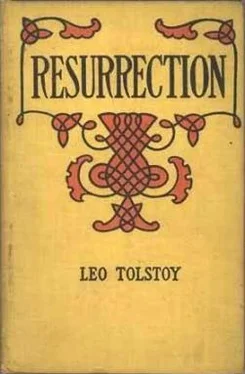Leo Tolstoy - Resurrection
Здесь есть возможность читать онлайн «Leo Tolstoy - Resurrection» весь текст электронной книги совершенно бесплатно (целиком полную версию без сокращений). В некоторых случаях можно слушать аудио, скачать через торрент в формате fb2 и присутствует краткое содержание. Жанр: Русская классическая проза, на английском языке. Описание произведения, (предисловие) а так же отзывы посетителей доступны на портале библиотеки ЛибКат.
- Название:Resurrection
- Автор:
- Жанр:
- Год:неизвестен
- ISBN:нет данных
- Рейтинг книги:4 / 5. Голосов: 1
-
Избранное:Добавить в избранное
- Отзывы:
-
Ваша оценка:
- 80
- 1
- 2
- 3
- 4
- 5
Resurrection: краткое содержание, описание и аннотация
Предлагаем к чтению аннотацию, описание, краткое содержание или предисловие (зависит от того, что написал сам автор книги «Resurrection»). Если вы не нашли необходимую информацию о книге — напишите в комментариях, мы постараемся отыскать её.
Resurrection — читать онлайн бесплатно полную книгу (весь текст) целиком
Ниже представлен текст книги, разбитый по страницам. Система сохранения места последней прочитанной страницы, позволяет с удобством читать онлайн бесплатно книгу «Resurrection», без необходимости каждый раз заново искать на чём Вы остановились. Поставьте закладку, и сможете в любой момент перейти на страницу, на которой закончили чтение.
Интервал:
Закладка:
But his excitement passed at once. The marechal do noblesse, of the district in which his largest estate lay, wrote only to let Nekhludoff know that there was to be a special meeting towards the end of May, and that Nekhludoff was to be sure and come to " donner un coup d’epaule ,” at the important debates concerning the schools and the roads, as a strong opposition by the reactionary party was expected.
The marechal was a liberal, and was quite engrossed in this fight, not even noticing the misfortune that had befallen him.
Nekhludoff remembered the dreadful moments he had lived through; once when he thought that the husband had found him out and was going to challenge him, and he was making up his mind to fire into the air; also the terrible scene he had with her when she ran out into the park, and in her excitement tried to drown herself in the pond.
“Well, I cannot go now, and can do nothing until I get a reply from her,” thought Nekhludoff. A week ago he had written her a decisive letter, in which he acknowledged his guilt, and his readiness to atone for it; but at the same time he pronounced their relations to be at an end, for her own good, as he expressed it. To this letter he had as yet received no answer. This might prove a good sign, for if she did not agree to break off their relations, she would have written at once, or even come herself, as she had done before. Nekhludoff had heard that there was some officer who was paying her marked attention, and this tormented him by awakening jealousy, and at the same time encouraged him with the hope of escape from the deception that was oppressing him.
The other letter was from his steward. The steward wrote to tell him that a visit to his estates was necessary in order to enter into possession, and also to decide about the further management of his lands; whether it was to continue in the same way as when his mother was alive, or whether, as he had represented to the late lamented princess, and now advised the young prince, they had not better increase their stock and farm all the land now rented by the peasants themselves. The steward wrote that this would be a far more profitable way of managing the property; at the same time, he apologised for not having forwarded the 3,000 roubles income due on the 1st. This money would be sent on by the next mail. The reason for the delay was that he could not get the money out of the peasants, who had grown so untrustworthy that he had to appeal to the authorities. This letter was partly disagreeable, and partly pleasant. It was pleasant to feel that he had power over so large a property, and yet disagreeable, because Nekhludoff had been an enthusiastic admirer of Henry George and Herbert Spencer. Being himself heir to a large property, he was especially struck by the position taken up by Spencer in Social Statics, that justice forbids private landholding, and with the straightforward resoluteness of his age, had not merely spoken to prove that land could not be looked upon as private property, and written essays on that subject at the university, but had acted up to his convictions, and, considering it wrong to hold landed property, had given the small piece of land he had inherited from his father to the peasants. Inheriting his mother’s large estates, and thus becoming a landed proprietor, he had to choose one of two things: either to give up his property, as he had given up his father’s land ten years before, or silently to confess that all his former ideas were mistaken and false.
He could not choose the former because he had no means but the landed estates (he did not care to serve); moreover, he had formed luxurious habits which he could not easily give up. Besides, he had no longer the same inducements; his strong convictions, the resoluteness of youth, and the ambitious desire to do something unusual were gone. As to the second course, that of denying those clear and unanswerable proofs of the injustice of landholding, which he had drawn from Spencer’s Social Statics, and the brilliant corroboration of which he had at a later period found in the works of Henry George, such a course was impossible to him.
IV
Missy.
When Nekhludoff had finished his coffee, he went to his study to look at the summons, and find out what time he was to appear at the court, before writing his answer to the princess. Passing through his studio, where a few studies hung on the walls and, facing the easel, stood an unfinished picture, a feeling of inability to advance in art, a sense of his incapacity, came over him. He had often had this feeling, of late, and explained it by his too finely-developed aesthetic taste; still, the feeling was a very unpleasant one. Seven years before this he had given up military service, feeling sure that he had a talent for art, and had looked down with some disdain at all other activity from the height of his artistic standpoint. And now it turned out that he had no right to do so, and therefore everything that reminded him of all this was unpleasant. He looked at the luxurious fittings of the studio with a heavy heart, and it was in no cheerful mood that he entered his study, a large, lofty room fitted up with a view to comfort, convenience, and elegant appearance. He found the summons at once in a pigeon hole, labelled “immediate,” of his large writing table. He had to appear at the court at 11 o’clock.
Nekhludoff sat down to write a note in reply to the princess, thanking her for the invitation, and promising to try and come to dinner. Having written one note, he tore it up, as it seemed too intimate. He wrote another, but it was too cold; he feared it might give offence, so he tore it up, too. He pressed the button of an electric bell, and his servant, an elderly, morose-looking man, with whiskers and shaved chin and lip, wearing a grey cotton apron, entered at the door.
“Send to fetch an isvostchik, please.”
“Yes, sir.”
“And tell the person who is waiting that I send thanks for the invitation, and shall try to come.”
“Yes, sir.”
“It is not very polite, but I can’t write; no matter, I shall see her today,” thought Nekhludoff, and went to get his overcoat.
When he came out of the house, an isvostchik he knew, with india-rubber tires to his trap, was at the door waiting for him. “You had hardly gone away from Prince Korchagin’s yesterday,” he said, turning half round, “when I drove up, and the Swiss at the door says, ‘just gone.’” The isvostchik knew that Nekhludoff visited at the Korchagins, and called there on the chance of being engaged by him.
“Even the isvostchiks know of my relations with the Korchagins,” thought Nekhludoff, and again the question whether he should not marry Princess Korchagin presented itself to him, and he could not decide it either way, any more than most of the questions that arose in his mind at this time.
It was in favour of marriage in general, that besides the comforts of hearth and home, it made a moral life possible, and chiefly that a family would, so Nekhludoff thought, give an aim to his now empty life.
Against marriage in general was the fear, common to bachelors past their first youth, of losing freedom, and an unconscious awe before this mysterious creature, a woman.
In this particular case, in favour of marrying Missy (her name was Mary, but, as is usual among a certain set, a nickname had been given her) was that she came of good family, and differed in everything, manner of speaking, walking, laughing, from the common people, not by anything exceptional, but by her “good breeding”—he could find no other term for this quality, though he prized it very highly——and, besides, she thought more of him than of anybody else, therefore evidently understood him. This understanding of him, i.e., the recognition of his superior merits, was to Nekhludoff a proof of her good sense and correct judgment. Against marrying Missy in particular, was, that in all likelihood, a girl with even higher qualities could be found, that she was already 27, and that he was hardly her first love. This last idea was painful to him. His pride would not reconcile itself with the thought that she had loved some one else, even in the past. Of course, she could not have known that she should meet him, but the thought that she was capable of loving another offended him. So that he had as many reasons for marrying as against it; at any rate, they weighed equally with Nekhludoff, who laughed at himself, and called himself the ass of the fable, remaining like that animal undecided which haycock to turn to.
Читать дальшеИнтервал:
Закладка:
Похожие книги на «Resurrection»
Представляем Вашему вниманию похожие книги на «Resurrection» списком для выбора. Мы отобрали схожую по названию и смыслу литературу в надежде предоставить читателям больше вариантов отыскать новые, интересные, ещё непрочитанные произведения.
Обсуждение, отзывы о книге «Resurrection» и просто собственные мнения читателей. Оставьте ваши комментарии, напишите, что Вы думаете о произведении, его смысле или главных героях. Укажите что конкретно понравилось, а что нет, и почему Вы так считаете.












